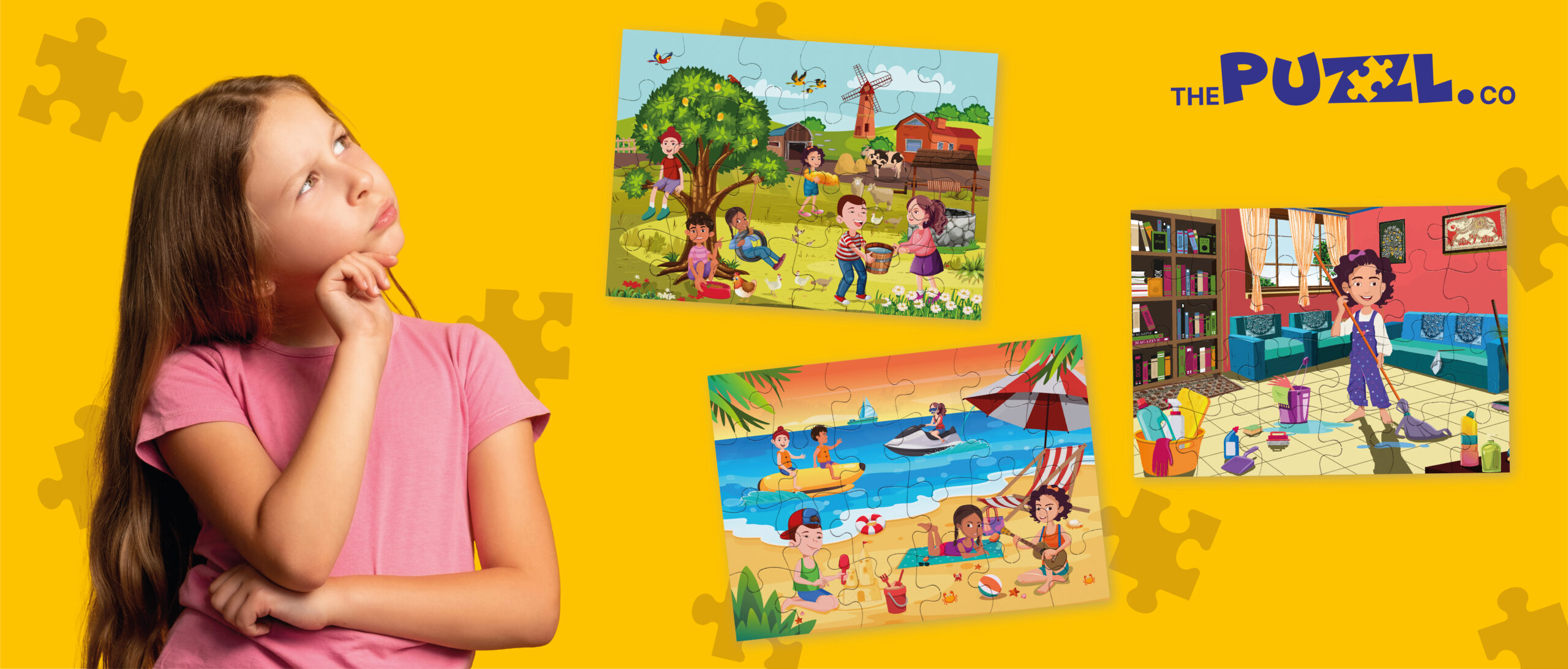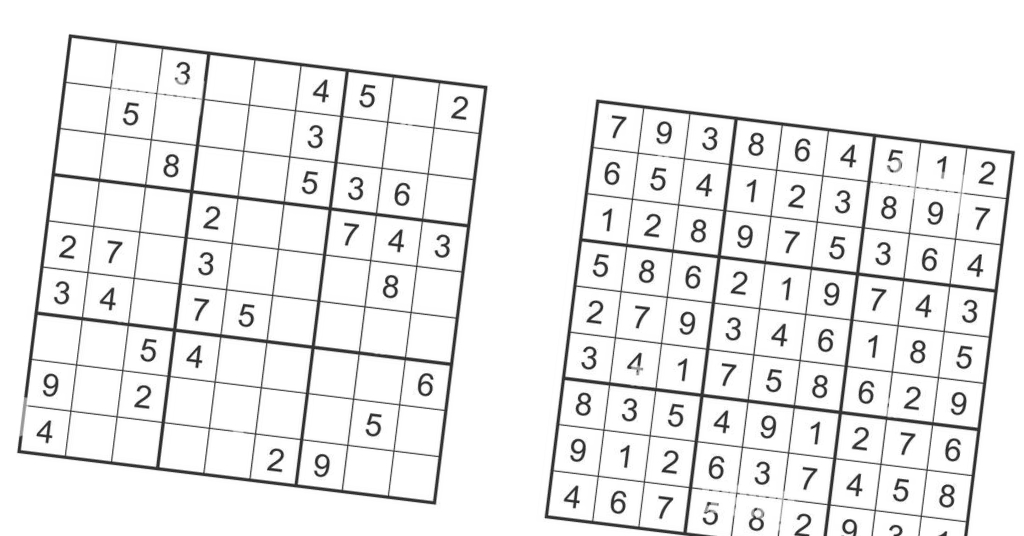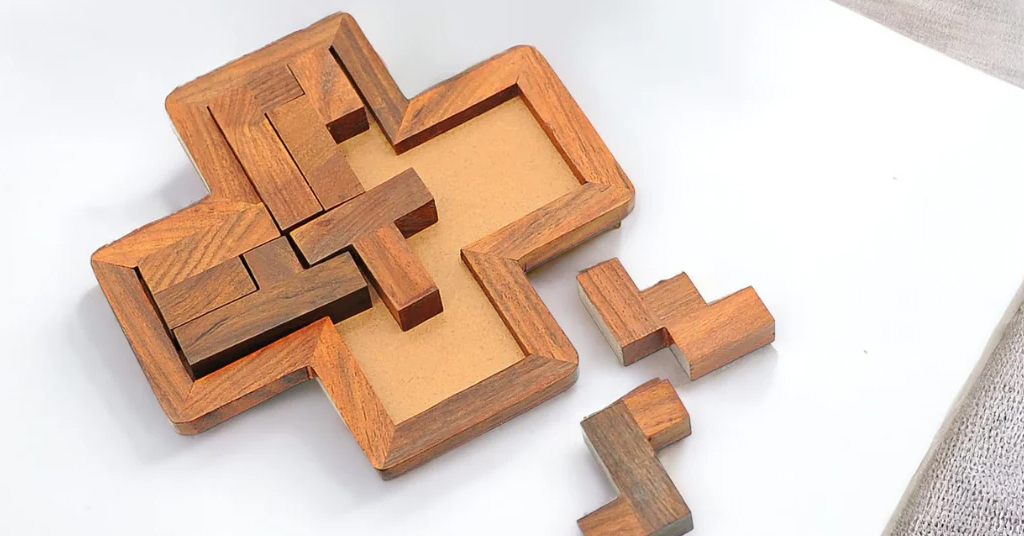Puzzles are a fantastic tool for children’s development. They promote critical thinking, problem-solving, hand-eye coordination, and patience. Choosing the right puzzles for your child’s age and developmental stage is crucial to keep them engaged and challenged without causing frustration. Here’s a guide to selecting the perfect puzzle for children aged 3 to 8 years.
Age 3 to 4 Years
At this age, children are developing their fine motor skills and hand-eye coordination. Jigsaw puzzles for kids should have large, easy-to-handle pieces. Look for puzzles with:
- Simple Images – Pictures of familiar objects like trees, mountains, and everyday household items.
- Few Pieces – Start with jigsaw puzzles containing 20 to 25 pieces. The simplicity helps children focus and not feel overwhelmed.
- Chunky Pieces – Larger pieces are easier for small hands to grasp, hold, and manipulate and reduce the risk of choking.
- Different Shapes and Sizes – Introducing puzzles with pieces of varying shapes and sizes can add a new level of challenge.
Age 4 to 5 Years
Children at this age have better dexterity and cognitive skills. They are ready for slightly more complex puzzles, which can help with problem-solving and spatial awareness. Look for puzzles with:
- More Detailed Pieces – Pictures that tell a story or have more elements to identify, so that kids can brainstorm and connect the pieces together.
- Interlocking Pieces – Standard jigsaw puzzles for kids that interlock are good for this age as they require more precision.
- 24 to 40 Pieces – Puzzles with more pieces help in developing attention span and problem-solving skills.
- Descriptive Scenes – Introducing puzzles with pieces of varying shapes, sizes, and characters can help engage children in imaginative play.
Age 5 to 6 Years
By this age, children’s cognitive and motor skills are significantly more developed. They can handle more complex jigsaw puzzles that require greater concentration and attention to detail. Look for puzzles with:
- Concept-based Puzzles – Kids at this age enjoy more detailed and meaningful puzzle games. Puzzles can include abstract concepts and complex images.
- Varied Themes – Puzzles featuring landscapes, maps, or scenes from real-life stories can attract children.
- Small Pieces – Transitioning to jigsaw puzzles with small pieces helps refine their motor skills further and adds a sense of challenge.
Age 6 to 7 Years
At this age, children are ready for puzzles that require strategic thinking and more detailed attention. They can take up new challenges and enjoy solving complex yet fun jigsaw puzzles by themselves and with peers. Look for puzzles with:
- Floor Jigsaw Puzzles – These puzzle games challenge their cognitive abilities and require longer attention spans.
- Complex Patterns – Puzzles featuring patterns, intricate designs, mosaics, and friendly characters can help ignite creativity in little explorers.
- Educational/Relatable Themes – Incorporate educational and relatable content such as geography, history, science, math, and more.
Age 7 to 8 Years
By this age, children gain the ability to handle jigsaw puzzles that require a high degree of concentration and advanced problem-solving skills.
- Learning-based Themes – Jigsaw puzzles that incorporate educational content such as gardens, forests, mountains, and other geographies attract children toward learning through play.
- Skill Development – Such jigsaw puzzle games enhance spatial reasoning and fine motor skills as children need to understand and assemble a structure from various angles.
- Complexity – Look for puzzles with detailed and intricate images. Scenes from nature, cityscapes, or fantasy worlds can captivate their interest.
Also Read – Why Puzzling?
Tips For Parents
- Follow their interests – Choose jigsaw puzzles that reflect your child’s interests, whether it’s animals, vehicles, geography, or educational topics.
- Gradual increase in difficulty – Start with simpler puzzles and gradually introduce more complex ones to build confidence and skill.
- Encourage patience – Puzzles can be challenging, so encourage your child to take breaks and return to the puzzle with a fresh perspective.
- Play together – Work on jigsaw puzzles together to make it a fun, bonding experience while guiding and supporting their efforts.
- Praise effort, not just success – Acknowledge the effort they put into solving puzzles, which fosters a growth mindset and resilience.



